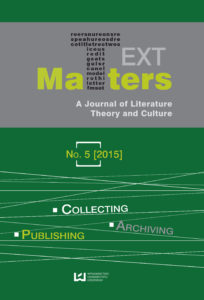In Praise of Slacking: Richard Linklater’s Slacker and Kevin Smith’s Clerks as Hallmarks of 1990s American Independent Cinema Counterculture
DOI:
https://doi.org/10.1515/texmat-2015-0014Abstract
Some people live to work, others work to live, while still others prefer to live lives of leisure. Since the Puritans, American culture and literature have been dominated by individuals who have valued hard work. However, shortly after its founding, America managed to produce the leisurely Rip Van Winkle, who, over time, has been followed by kindred spirits such as, for instance, Walt Whitman, Henry David Thoreau, Twain’s Huck Finn, Melville’s Bartleby, Jack Kerouac, Diane di Prima, the Hippies, and Christopher McCandless. With the rise of the Indie Film movement of the 1990s, so came the rise of the slacker film. Films such as Slacker (1991), Singles (1992), Wayne’s World (1992), Reality Bites (1994), Clerks (1994), Kicking and Screaming (1995), Mallrats (1995), Chasing Amy (1997), The Big Lebowski (1998), and Office Space (1999) filled theatres over the decade with characters who take an unorthodox view of work and stress the importance of leisure in life. This essay discusses two slacker films, Richard Linklater’s Slacker (1991) and Kevin Smith’s Clerks (1994), which defined the slacker phenomenon in the 1990s and constituted two important landmarks in American independent film. While many of us may find the slacker pathetic and annoying, this essay argues that there is much value to be found in this healthy counterculture. By offering their perspectives on issues such as the Puritan work ethic, work-incited self-importance, leisure versus idleness and human relationships, Linklater and Smith join the preceding generations of slackers, providing a much needed balance to the American obsession with work and success.
Downloads
References
Ames, Mark. Going Postal: Rage, Murder, and Rebellion: From Reagan’s Workplaces to Clinton’s Columbine and Beyond. Brooklyn, NY: Soft Skull, 2005. Print.
Google Scholar
Baumgarten, Marjorie. “Slack Where We Started: Richard Linklater and John Pierson Ponder Slacker and Its Aftermath.” Austinchronicle.com. Austin Chronicle 29 June 2001. Web. 20 Jan. 2014.
Google Scholar
Berecz, John M. Character in Chief: Personality and Character of George W. Bush and Past Presidents. Atlanta, GA: Humanics Trade Group, 2001. Print.
Google Scholar
Calvin, John. The Institutes of the Christian Religion. Trans. Henry Beveridge. Grand Rapids, MI: Christian Classics Ethereal Library, 1845. Web. 25 Jan. 2014. PDF file.
Google Scholar
Canby, Vincent. “Some Texas Eccentrics and Aunt Hallie.” New York Times 22 Mar. 1991: C8. Print.
Google Scholar
Clerks. Dir. Kevin Smith. Perf. Brian O’Halloran, Jeff Anderson, Jason Mews, Kevin Smith and Marilyn Ghigliotti. 1994. Buena Vista, 2005. DVD.
Google Scholar
Diran, Mita. “30 hours of working and still going strooong.” 14 Dec. 2013, 2:47 a.m. Tweet.
Google Scholar
Ebert, Roger. Rev. of Clerks. RogerEbert.com. Reviews 4 Nov. 1994. Web. 12 Dec. 2013.
Google Scholar
Gini, Al. The Importance of Being Lazy: In Praise of Play, Leisure, and Vacations. London: Routledge, 2003. Print.
Google Scholar
Hodgkinson, Tom. The Freedom Manifesto. New York: Harper, 2006. Print.
Google Scholar
Honoré, Carl. In Praise of Slowness: Challenging the Cult of Speed. London: Harper, 2005. EPUB file.
Google Scholar
Lutz, Tom. Doing Nothing: A History of Loafers, Loungers, Slackers, and Bums in America. New York: Farrar, 2006. Print.
Google Scholar
Macor, Alison. Chainsaws, Slackers, and Spy Kids. Austin: U of Texas P, 2010. Print.
Google Scholar
National Film Preservation Board. National Film Registry Titles 1989-2013. 26 Sep. 2014. Web. 22 Nov. 2014.
Google Scholar
Pieper, Joseph. Leisure: The Basis of Culture. Trans. Gerald Malsbary. South Bend, IN: St. Augustine’s P, 1998. Print.
Google Scholar
Robinson, Joe. “The Vanishing Vacation: Why You Need a Break.” Nationalgeographic. com. 2007. Web. 10 Jan. 2014.
Google Scholar
Russell, Bertrand. The Conquest of Happiness. London: Allen & Unwin, 1932. Print.
Google Scholar
Savlov, Marc. Rev. of Slacker (DVD Criterion Collection). Austinchronicle. com. Austin Chronicle 10 Sep. 2004. Web. 11 Jan. 2014.
Google Scholar
Savlov, Marc. “Slack to the Future: Austin gets older; Slacker stays forever young.” Austinchronicle.com. Austin Chronicle 21 Jan. 2011. Web. 5 Jan. 2014.
Google Scholar
Slacker. Dir. Richard Linklater. Perf. Richard Linklater, Rudy Basquez, Jean Caffeine and Jan Hockey. 1991. Criterion, 2004. DVD.
Google Scholar
Smith, Chris. “Register Dogs.” New York Magazine 24 Oct. 1994: 50-53. Print.
Google Scholar
Steiner, Susie. “Top Five Regrets of the Dying.” Guardian.com. Guardian 1 Feb. 2012. Web. 20 Jan. 2014.
Google Scholar
Walters, Chris. “Slacker: Freedom’s Just Another Word for Nothing to Do.” Criterion.com. Criterion 13 Sep. 2004. Web. 10 Jan. 2014.
Google Scholar
Downloads
Published
How to Cite
Issue
Section
License

This work is licensed under a Creative Commons Attribution-NonCommercial-NoDerivatives 4.0 International License.













